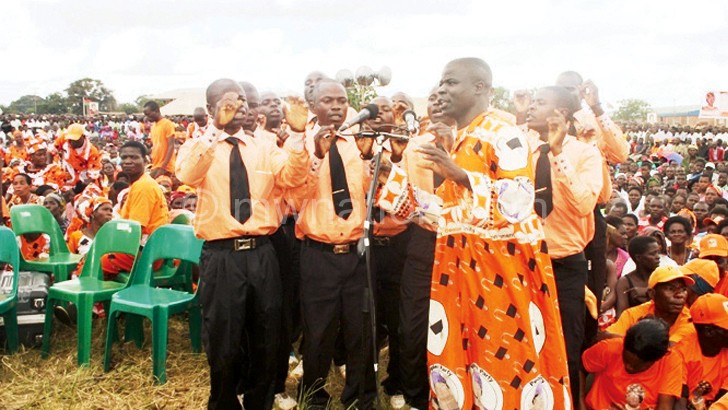When art meets politics…
When art meets politics, something has to give. The late Mao Tse-tung, the founding father of the People’s Republic of China, once said on the delicate relationship between art and politics: “There is, in fact, no such thing as art for art’s sake, art that stands above classes, art that is detached from or independent of politics.”
Some have counter-argued that when art thrives where politics flourishes, it puts on the line one of the central tenets of art, which is that it must reflect society. But politics tends to operate in an artificial environment, far removed from the demands of society.

party’s campaign meetings
Hence, any art that goes to bed with politics runs the risk of ignoring its obligations and becoming an extension of politics—it becomes praise art, and not art for its own sake. Art is a powerful tool for expressing people’s aspirations and politicians are not averse to manipulating it for their ends.
In Malawi, subsequent political movements have been quick to harness the power and pull of art to drive their agenda, sometimes to the detriment of art and the artists involved.
Former president Joyce Banda (JB) had a number of artists she exploited as she criss-crossed the country on her calamitous campaign to canvas for people’s support. One of such artists that readily springs to mind is Paul Daveson, whom JB christened ‘Michael Jackson’ for his captivating performances during her political rallies.
Daveson could dance; he could send people into stitches with his hilariously weaved lyrics; and Daveson was flamboyant in his dress. Above all, JB’s version of ‘Michael Jackson’ could mesmerise masses who thronged her rallies—including radio and television audiences alike.
But all that is consigned to a fading memory. Daveson, who was a household name just over a year ago, is now almost forgotten. Nothing could aptly illustrate the commonly held view that when politics and art meet, the results are disastrous.
Daveson reflected on the political fervour of the time to whose discourse he contributed with his compositions that struck a chord with many—especially those in the Orange camp—but inspired fewer of them to turn the lyrics into a victory for his sponsor, JB. His pro-establishment songs earned him praise and scorn in equal measure.
The 31-year-old father of three has few regrets for performing at JB’s rallies but he feels it is grossly inaccurate to associate him and Khuwi Anglican Choir, which he leads, with the People’s Party (PP).
“What many people don’t know is that as a group, we belong to the Khuwi Congregation of the Anglican Church in Ntchisi. We only started to perform at JB’s rallies after a PP campaign director for Ntchisi South Constituency watched us performing in church. He then linked us to PP’s top officials and eventually, Joyce Banda.
“She liked us after just a single performance and she would invite us everywhere she went, especially in the Central Region. But, I must say, we are comfortable to work with any politician, political grouping or non-partisan organisation as long as they tell us the messages they want us to pass on to people following proper procedures with our church elders,” Daveson told Society recently.
One of his most enduring compositions chided the late Bingu wa Mutharika for failing the country and praised JB for putting things in order. Its chorus went as follows: Adaliko anthu ena amuna ankalamula dziko lino/koma lidawalephera ndipo lero lino ali kumanda/Koma mayi akulamula kuposa azibambo/zomwe zinkawalephera lero Joyce alukwanitsa.
“Without wanting to sound too political, but I miss Joyce Banda and I still wish to continue talking to her because she is a kind and compassionate lady who understands the plight of the poor,” reminisced Daveson.
He is grateful to JB for exposing him and the choir as entertainers to the whole country.
“We didn’t get a lot of money from our performances, but I shall always cherish the cow she gave us through her ‘A Cow A Family’ programme. We used to be close and she really loved me. I even considered meeting her to ask if she could sponsors my education because I am a Form Two dropout. I quit school because my benefactor passed away and my poor parents couldn’t afford to raise enough money for my fees. I am pretty certain she would have helped me. But fate intervened; she lost the elections and communication broke down between us,” explained Daveson.
But, how did a choir from the backwaters of Malawi earn such recognition?
Daveson said they owe it all to a Yasini Blackson—now deceased—a carpenter and builder who hailed from Kondwani Village in Traditional Authority (T/A) Ndindi in Salima.
“Our manner of singing was introduced to us by Yasini. When he saw us sing in church one day, he knew we had the potential to become bigger and introduced the kind of singing we are well known for today. He died in 2006 but we kept on with the tune he had left us with. Yasini mentored me so much that I owe everything to him because he added value to the already existent capabilities in me,” he said.
On the way forward, Daveson—who is currently farming a small scale and operating a grocery at his home village of Mando in T/A Kalumo in Ntchisi—revealed that he is planning to venture into ‘serious’ spiritual music.
“I am only lacking sponsorship, but I have enough songs for 10 albums and I can jump into a studio even today,” said Daveson.n





